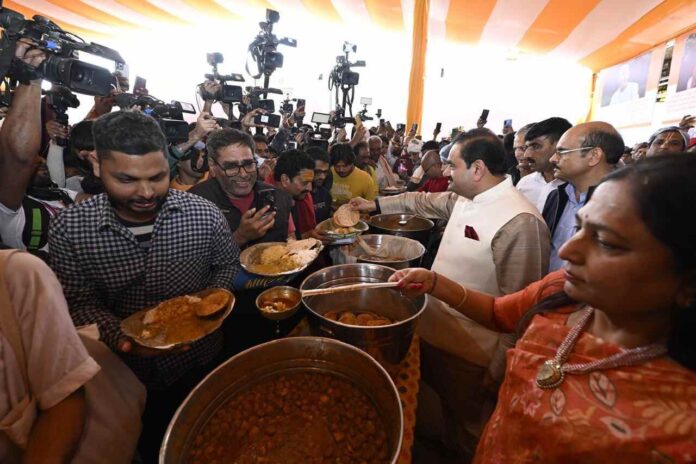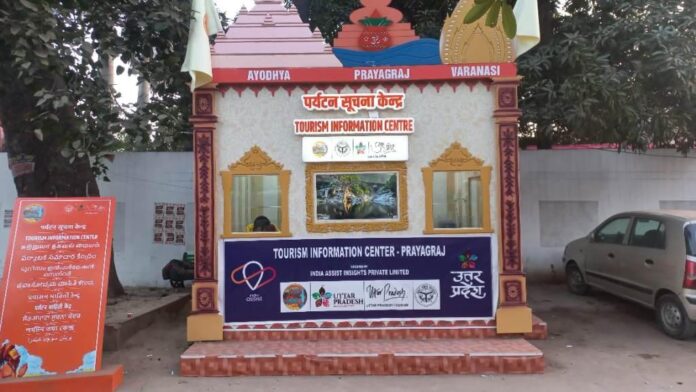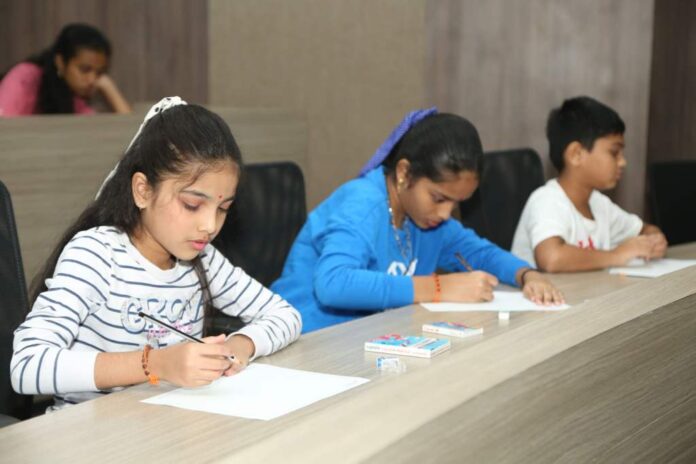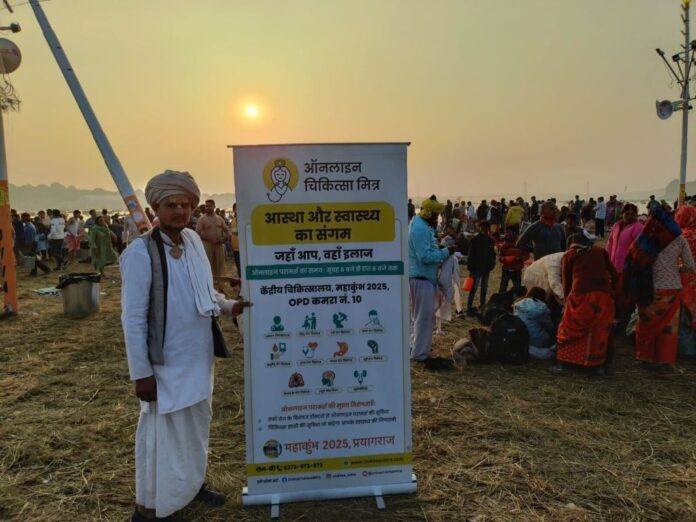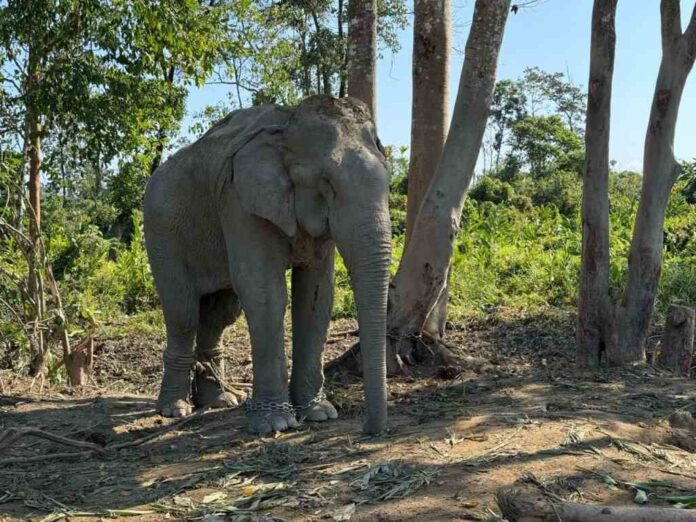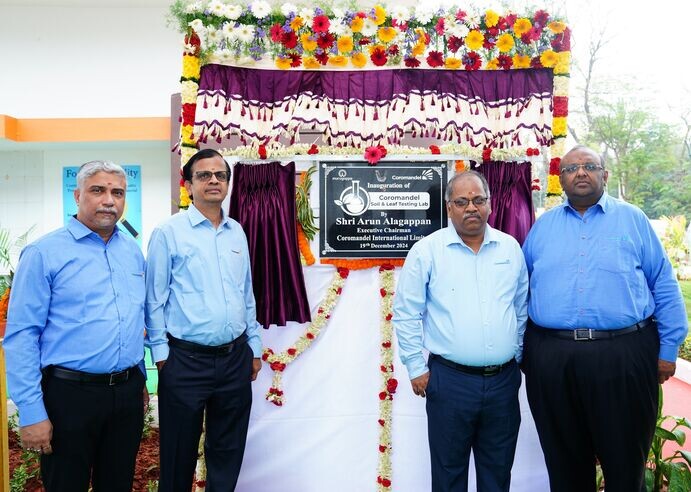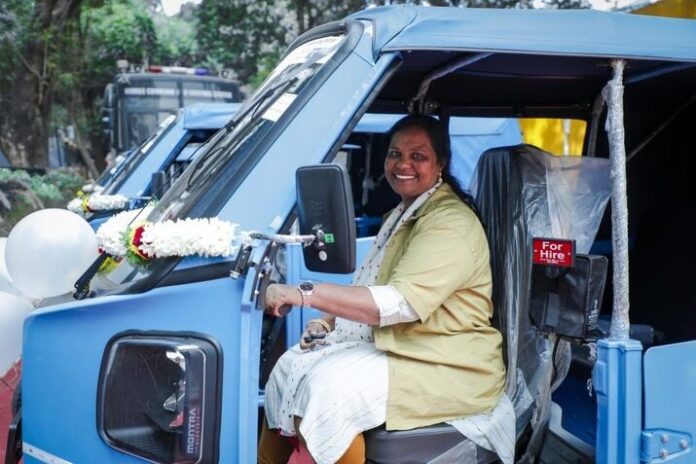CSR partnership with Uttar Pradesh Government for Mahakumbh 2025 and Tourist Information Centres across the state
Prayagraj, Uttar Pradesh: India Assist, a leader in tech-enabled travel assistance, has partnered with the Uttar Pradesh Government to upscale the travel experience for millions of visitors during Mahakumbh 2025 and beyond. This ongoing collaboration sees India Assist actively operating Tourist Information Centres (TICs) within the Mahakumbh area in Prayagraj, along with additional TICs located at the city’s railway station and airport.
As Mahakumbh 2025 unfolds, drawing over 40 crore pilgrims and tourists from across India and abroad, India Assist’s dedicated TICs are proving to be pivotal in enhancing the travel experience. These centers are offering real-time assistance to visitors, providing guidance on navigation, local attractions, and crucial emergency support, such as medical aid and theft resolution. The initiative continues to showcase how technology and human-driven support come together to ensure travelers can confidently navigate the Mahakumbh, one of the largest human gatherings in the world.
Mr. Harish Khatri, Founder of India Assist, shared his enthusiasm for the collaboration, stating, “India is a country of diverse experiences and cultural treasures, and Mahakumbh stands as an incredible amalgamation of spiritual and cultural unity. Through this ongoing partnership, we are privileged to help millions of visitors celebrate this extraordinary event with ease and confidence. By blending innovative technology with on-ground human support, we ensure that every visitor feels guided and cared for throughout their journey.”
As the event continues, the TICs are not only offering immediate travel assistance but are also introducing visitors to the benefits of tech-enabled services, encouraging the use of digital tools for ongoing travel support. By seamlessly combining cutting-edge technology with local expertise, India Assist is enhancing the Mahakumbh experience and setting new standards for tourism across Uttar Pradesh.
Beyond Mahakumbh, India Assist’s role extends to managing a network of TICs in key cities across Uttar Pradesh, including Agra, Lucknow, Varanasi, Ayodhya, and others. These centers are providing visitors with timely information and assistance, ranging from basic inquiries to urgent support, ensuring that travelers’ journeys remain safe, enjoyable, and worry-free.
With the Ongoing Mahakumbh 2025, India Assist’s ongoing efforts reflect the growing potential of travel technology to elevate visitor experiences and strengthen Uttar Pradesh’s position as a leading global travel destination.
Disclaimer: This media release is auto-generated. The CSR Journal is not responsible for the content.
Anxiety, Depressive and Panic Disorders Top Workplace Mental Health Requests
Mumbai, India: Soaring rates of workplace stress and anxiety are evident, with approximately 40% of the workforce reporting stress levels that significantly impacted their ability to work in the last year. As we approach ‘Blue Monday’, known as one of the most challenging days for mental health, International SOS, the world’s leading health and security risk services company, calls on organisations to take proactive steps in addressing the mental health challenges of employees.
International SOS has identified the three most frequent mental health-related requests it has received from global workforces across various sectors over the past three years. These include support and assistance for:
1. Anxiety disorder: intense and excessive fear and distress, often accompanied by physical tensions.
2. Depressive disorder: mental health condition characterised by persistent feelings of sadness, emptiness, or loss of interest. It can significantly impact an employee’s emotions, behaviour, and physical health.
3. Panic disorder: a condition when an employee has repeated, unexpected panic attacks and worries constantly about when the next one might happen.
For individuals living with mental health conditions, meaningful employment can significantly contribute to their recovery and social inclusion, fostering increased confidence and improved social functioning. Research findings indicate that employment can have a more profound positive impact on mental health outcomes than traditional psychiatric care alone. However, when an employee experiences ongoing workplace stress, it causes an elevated level of anxiety-causing hormones. This sustained pressure can leave employees feeling fatigued and exhausted and, ultimately, may contribute to burnout. Without robust support, mental health conditions can severely impact an individual’s self-confidence, job satisfaction, and ability to thrive in the workplace.
Dr Rodrigo Rodriguez-Fernandez, Global Health Advisor, Wellness and Mental Health, at International SOS, comments, “January and the start of a new year can be a particularly challenging time for many. The post-holiday blues, the return-to-work routines, and the harsh winter weather in the northern hemisphere can really take a toll on mental health and wellbeing. Blue Monday presents a crucial opportunity for organisations to proactively address mental health challenges for the year ahead and cultivate a culture of wellbeing that extends far beyond this single day.”
“For organisations, recognising the inextricable link between good mental health, employee wellbeing, and organisational effectiveness is paramount. Alarmingly, workplace stress and anxiety rates remain high, with around 15% of the global working-age population suffering from mental illness.4 The detrimental effects of stress are multifaceted and can include circulatory and gastrointestinal issues, as well as significant physical and emotional repercussions.5 Protecting and promoting mental health in the workplace is about strengthening capacities, increasing awareness, and offering early intervention opportunities for those in need.”
International SOS offers five points for organisations to implement proactive strategies to address stress and anxiety in the workforce:
1. SUPPORT
Foster a supportive culture and work environment: create a workplace culture that values open communication and support. Encourage employees to speak up about their stress levels and provide a safe space for them to share their concerns without fear of judgment or repercussions.
2. BALANCE
Promote work-life balance and implement flexible work arrangements: consider changing time-off policies to accommodate employees’ mental health needs. Encourage employees to take breaks and set boundaries between work and personal life.
3. ASSESS
Conduct regular stress assessments: regularly assess the stress levels within the organisation through surveys, feedback sessions, and health screenings. Use the data collected to identify stressors and implement targeted interventions to address them.
4. ASSIST
Offer Employee Assistance Programmes (EAPs): ensure easily accessible resources for mental health support, including workshops for stress management techniques, counselling services and mental health hotlines.
5. TRAIN
Equip managers with mental health first-aid training: upskill managers to identify signs of distress and offer initial support to employees who may be struggling.
Disclaimer: This media release is auto-generated. The CSR Journal is not responsible for the content.
CSR News: Food 4 Thought Foundation collaborates with Cyient Foundation to organize IRO Lit Festival 2025 in Hyderabad
Hyderabad, India: Food 4 Thought Foundation collaborated with Cyient Foundation, the CSR arm of Cyient Ltd., a global Intelligent Engineering services company, Monocept Consulting and Emesco Books to organize the 7th India Reading Olympiad (IRO) Lit Festival 2025 at Cyient’s Manikonda Campus today.
As part of IRO Lit Festival 2025, Cyient Foundation also supported Food 4 Thought Foundation in organizing India’s 2nd Reading Decathlon—a reading-based quiz competition in which students from 12 schools across India competed in 10 intense rounds of reading challenges, lasting over 8 hours and consisting of 200 questions, to find the next Reading Champion of India.
Food 4 Thought Foundation is a not-for-profit organization dedicated to promoting reading habits among urban children and youth. This partnership reflects the Cyient Foundation’s commitment to fostering long-term societal development through sustainable education and literacy initiatives.
Mr. Prabhakar Atla, President and Chief Financial Officer, Cyient said, “At Cyient, we believe education is the cornerstone of societal progress. One of the core objectives of Cyient Foundation is to enable long-term societal development through sustainable programs in education and literacy.”
Mr. Atla added, “Our collaboration with Food 4 Thought Foundation reflects our shared vision of promoting reading habits, especially among urban children and youth who have access to books but may have lost interest in reading. By supporting initiatives like the Reading Decathlon, we aim to rekindle the joy of reading and empower future generations to achieve their full potential. Together, we are creating a platform that fosters intellectual curiosity and empowers future generations to achieve their potential.”
Shefali Rao, Co-Founder of the Food 4 Thought Foundation, said, “We firmly believe that a nation’s progress is to be measured not only by its GDP but also by GGP (Ghar Ghar Pustakalaya) and that fostering a culture of reading and learning is integral to shaping the citizens and leaders of tomorrow. Collaborations between Cyient Foundation and Food 4 Thought Foundation are pivotal in driving impactful reading initiatives. By inspiring young minds and engaging readers across all ages, these programs are not just promoting reading habits but also building a foundation for a more informed and empowered society.”
Various engaging parallel tracks such as the Author’s Corner, Kids Reading & Activity Corner, Storytelling Sessions, and Cozy Book Nooks provided an immersive experience, captivating readers of all ages throughout the day.
Disclaimer: This media release is auto-generated. The CSR Journal is not responsible for the content.
CSR News: Collaboration with the UP Health Department to Provide Telemedicine Services at Mahakumbh 2025
Prayagraj, India: Online Chikitsa Mitra (OCM), India’s leading health-tech startup transforming healthcare access in rural and semi-urban areas, has been chosen by the health department of the UP government as the exclusive health technology partner for Mahakumbh 2025. The partnership brings specialized, free-of-cost healthcare services to the world’s largest religious gathering, expected to witness a footfall of over 40 crore pilgrims.
This collaboration marks a major milestone in OCM’s mission to make healthcare accessible to even the remotest corners of the country. At Mahakumbh, OCM is operating a telehealth outpatient department (OPD) from 8 a.m. to 8 p.m. daily, where trained nurses record patients’ vitals and facilitate online consultations with doctors at no cost. The team of doctors includes specialists in internal medicine, dermatology, gynecology, neurology, cardiology, and more. In the last week, OCM successfully completed 350+ online consultations.
Speaking about the collaboration, Smriti Tandon, Co-founder at Online Chikitsa Mitra, said, “We are honored to work alongside the state government and associated hospitals to deliver healthcare support at an event of such unprecedented scale. This partnership reflects our commitment to making quality healthcare a reality for every Indian. By utilizing technology and mobilizing our team, we aim to create a safe and supportive healthcare environment for all pilgrims attending Mahakumbh 2025.”
Shri Krishna Kant, Sector Magistrate, added “At Mahakumbh Prayagraj, our focus is to provide the best possible healthcare support to all pilgrims throughout the event. We have set up extensive medical facilities, hospital to meet their needs. As part of the Digital Mahakumbh initiative, we are leveraging advanced technologies to improve healthcare services. Our partnership with Online Chikitsa Mitra brings telemedicine expertise to ensure seamless and accessible medical care.”
The partnership highlights the government’s focus on integrating innovative technology into public healthcare services to enhance accessibility for underserved populations. By collaborating with OCM, the initiative aims to set a benchmark for future public-private partnerships in strengthening the country’s healthcare infrastructure.
Disclaimer: This media release is auto-generated. The CSR Journal is not responsible for the content.
Vantara to welcome 20 rescued elephants from logging industry and two from ISKCON Mayapur
Anant Ambani’s dream project Vantara is all set to welcome 20 elephants from Arunachal Pradesh which have been rescued from the exploitation of the logging industry. There are 10 male elephants, eight females, one sub-adult, and one calf among the rescued animals.
At the same time, two female elephants from the International Society for Krishna Consciousness (ISKCON) in Mayapur, near Kolkata, are set to find their new home at animal welfare organisation located in Gujarat’s Jamnagar. These elephants will be kept free of chains at Vantara and never forced into labour.
20 elephants rescued from logging industry
Twenty elephants, rescued from the exploitation of the logging industry, will be given shelter at Anant Ambani’s Vantara, as per an announcement made by Reliance Industries. Elephants suffer a lot in the logging industry as they are forced to carry heavy logs and work tirelessly for long hours.
The elephant rescue operation has been done with the approval of a high-powered committee constituted by the Tripura High Court and entrusted by the Supreme Court of India. The rescue operation has been made after full consent of the current owners of the animals.
Talking about the same, Tabang Jamoh, Divisional Forest Officer, Namsai shared, “With an active breeding population of approximately 200 captive elephants in Arunachal Pradesh, DNA profiling is being conducted to closely monitor their health and welfare. The transfer of 20 elephants to the Radhe Krishna Temple Elephant Welfare Trust at Vantara, as directed by the Supreme Court-appointed committee ensures a bright future for these animals. This initiative enhances animal welfare when providing local communities with alternative livelihoods, striking a balance between conservation, community well being and forest protection.”
The rescued elephants will be transported from their current home in Arunachal Pradesh to the rescue centre in Jamnagar. Specially-designed elephant ambulances are being used to transport these elephants from Arunachal Pradesh to Gujarat.
The elephants have been suffering since a long time due to exploitation in the logging industry. One 10-year-old sub-adult, named Laxmi who was born in captivity, struggles to bear weight on her hind legs due to deep, untreated wounds. Laxmi also has a fresh hole of one-inch diameter piercing her right ear pinna. Both the injuries were caused to her during brutal taming process by human trainers. Maya, a 2-year-old captive-born calf was rescued along with her mother.
Vantara to give shelter to two elephants from ISKCON Mayapur
Vantara will also be the new home for two female elephants from the International Society for Krishna Consciousness (ISKCON) in Mayapur, near Kolkata, which were used for performing regular temple rituals and during festivals.
The two elephants are Bishnupriya (18 years) and Lakshmipriya (26 years). While Lakshmipriya has been staying at ISKCON Mayapur since 2007, Bishnupriya was living there since 2010. In April, last year one of the two elephants attacked her mahout leaving him fatally injured.


